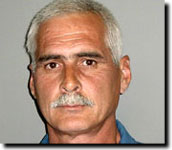Latest Drug War News
These stories can't be told without your help.
Donate Today.
Latest Drug War News
These stories can't be told without your help.
Donate Today.
|
 |
Michigan Lifer Masters Mathematics, Braille Transcribing
Ramon Cobos is a 49-year-old Michigan prisoner serving two life sentences (running concurrently) for a violation of State drug laws. He's been in prison for nearly 17 years, but despite such restrictions, he's achieved national notoriety and great respect for developing a skill as Braille transcriber of mathematics.
Cobos was born in Cuba, earned a mechanical/metallurgical engineering degree and held a responsible position in a government laboratory before fleeing the island and seeking asylum in the United States. Unable to speak and write English with sufficient fluency to be employed as an engineer, he found a job as an unskilled factory laborer at Michigan Casting Corporation in Romeo, Michigan.
Cobos married Vicki Earl in 1987. During her pregnancy in 1988, Cobos was injured in an industrial accident and could not work. With only $268 dedicated to them every two months from State unemployment compensation, desperation set in and everything got worse.
It seems clear that language barriers from the start set the limits and prospects for Cobos' eventual arrest. A friend named Ken was trying to help Ramon find paying work where speaking English properly wouldn't be an automatic bar to being hired, and he did. But this was, apparently, a twisty job interview involving unlikely co-workers.
According to Cobos, "Undercover police officers, using an informant, and posing as Mafia figures Tony Tocco and his body guard, used threats to me and my family that persuaded, intimidated and convinced me to deliver cocaine." Although there was no money exchanged for the delivery of more than 650 grams of cocaine, Cobos was arrested, tried, found guilty and in 1989 sentenced to life in prison under authority of Michigan's harsh drug laws. One of his similarly-situated codefendants, Kenneth Smith, was paroled six years ago.
Accomplishments in Custody
Early in his sentence Cobos educated himself in English. After working for a couple years as a clerk and shoe-factory mechanic, he began full-time work in 1991 as a Braille transcriber-trainee. He completed the transcription course and was certified as a literary Braillist on December 30, 1993 by The Library of Congress in Washington, DC.
For the next two years he transcribed literary textbooks in history, language arts, and reading. Cobos then completed the Nemeth Braille Code for Mathematics and Science Notation course, equivalent to a post-graduate level degree-and was certified as a Nemeth Braillist on December 2, 1995 by the Library of Congress.
The more advanced Braille language is required for transcription of algebra, calculus, chemistry and other mathematics and science textbooks. Cobos became a teacher in Braille Literature and Mathematics for other prisoners.
Ramon Martinez Cobos is one of only a handful of Braillists available in the US for the most complex transcriptions. For instance, Cobos fulfilled a request by the QUALCOMM Corporation of San Diego for the transcriptions of advanced computer code used by visually impaired employees in the development of their sophisticated communications technology. He's also transcribed maps for the Michigan Transit Authority to provide maps of bus routes in Braille to blind citizens.
Cobos has also transcribed documents in Braille for the Michigan Supreme Court concerning the Michigan Handicapper Civil Rights Act. In 1997 he began working full-time as a volunteer at Prison Legal Services of Michigan, Inc. (PLSM). He became an (in-prison) assistant to the staff attorney, transcribed Court Orders, letters from PLSM staff to non-English-speaking people and visually impaired prisoners.
Arguably, Ramon Cobos exemplifies a useful model of human development by doing what he's done under very inhumane conditions of a life sentence in prison. By learning English, Ramon became valuable as a translator and has often served these needs of Hispanic prisoners over the years.
He's been a member of the Hispanic Americans Striving for Advancement (HASTA), National Association for Advancement of Colored People (NAACP), and from 1993 through 2000 was a member of the National Lifers Association. Currently, he is a member of the prestigious National Braille Association.
In 1994 he became a plaintiff in the Cain, et.al. v. Michigan Department of Corrections' class action case. Plaintiffs presented a cause of action dealing with prisoners' personal property rights, access to the courts, classification, and the illegal tax on the prisoners' families when accepting collect calls from correctional facilities. Cobos continues to keep the Cain suit alive in court, and in 1995 was appointed as a Member of the Board of Directors of Prison Legal Services of Michigan.
Despite being imprisoned for nearly 17 years, Ramon Cobos has maintained a positive relationship with his 16-year-old daughter. Mr. Cobos welcomes correspondence with interested writers.
Ramon Martinez Cobos -200306
Michigan Department of Corrections
G. Robert Cotton CF
3500 North Elm Rd.
Jackson, Michigan 49201Editor: On March 18, 2004 the Michigan Parole Board decided it had "no interest" in taking action on the eligibility of Ramon Cobos for parole. Mr. Cobos must now wait until August 2008 for another chance to be paroled. Despite the Board members' disinterest, others were not, including former Michigan Governor William G. Milliken, who submitted paperwork to the Parole Board urging action to release Cobos.
The Cobos' case illustrates why parole boards must be observed and evaluated by community organizations and individuals who can do an honest and open job of assessing eligible prisoners. Surely it's time for parole boards to fully explain in writing why a decision was made for release, or not.
(Click here to read a letter in support of Ramon Cobos, from the Michigan Braille Transcribing Fund)
Posted 6/9/05
Meet the People Behind The U.S. Sentencing Guidelines
Questions or problems? Contact webmaster@november.org